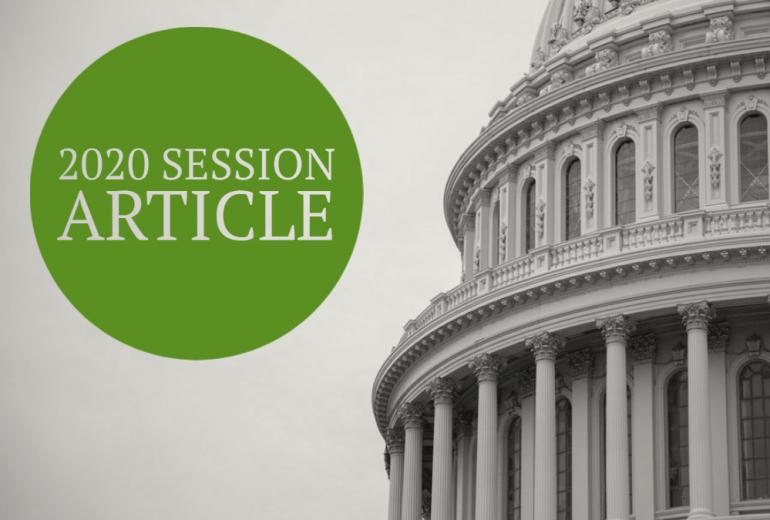2020 Session Article

Amid the backdrop of the Coronavirus (COVID-19) outbreak, Florida lawmakers concluded the 2020 Legislative Session after a one-week extension to finish the budget and ensure adequate reserves for the impending public health emergency.
The 2020 Session was uniquely challenging as lawmakers faced an unknown emerging worldwide pandemic that began spreading quickly during the final weeks of Session.
This Session, lawmakers passed a total of 210 bills and approved a $93.2 billion balanced state budget. Several important bills passed related to Florida’s environmental regulation, agriculture, and water quality. Additionally, the Legislature continued its investment in protecting the environment and water quality by increasing funding for restoration and water quality improvement projects, Red Tide and toxic algae research, and septic-to-sewer conversions. Both the legislation and increased funding are critical components of a long-term strategy to restore and protect Florida’s unique natural environment and the quality of life we all enjoy.
The following sections are highlights of this year’s budget and major legislation influencing environmental restoration, the agriculture industry, and Florida’s rural communities.
Environmental Policy Highlights
Senate Bill 712—Environmental Resource Management. SB 712, commonly referred to as the “Clean Waterways Act,” is a sweeping water quality measure that takes a major step toward easing runoff from farms and development that have fed algae blooms plaguing the state. The bill implements the recommendations of the Blue-Green Algae Task Force in order to stop excess pollution and restore waterways. This comprehensive legislation addresses many sources of environmental pollution by reforming policy related to septic tanks, biosolids, wastewater and storm water infrastructure, and agriculture. The Clean Waterways Act:
- Directs the transfer of the Onsite Sewage Program from the Department of Health to the Department of Environmental Protection (DEP), by July 1, 2022.
- Establishes state grant programs within the DEP.
- Directs DEP to update its stormwater management rules in effort on improving infrastructure and preventing nutrient pollution.
- Instructs DEP to adopt rules to address biosolid management and ensure water quality standards are met.
- Coordinates with the agriculture industry to document fertilizer use and implement Best Management Practices to minimize effects on the environment.
- Requires backup generation plans during power outages to wastewater systems in order to prevent sanitary overflows.
House Bill 1091—Environmental Accountability. HB 1091increases various statutory penalties for environmental permitting violations and specifies that each day an unauthorized discharge of domestic wastewater is not addressed would be considered a separate offense until the violation is resolved by order or judgment. The bill also encourages each county and municipality, by July 1, 2022, to establish an evaluation and rehabilitation program for sanitary sewer laterals on residential and commercial properties in order to identify and reduce leaking sanitary sewer laterals. Lastly, HB 1091 requires a seller of real property, before executing a contract for sale, to disclose to a prospective purchaser any known defects in the property’s sanitary sewer lateral.
Senate Bill 1276—Department of Citrus. SB 1276 establishes the Friends of Florida Citrus Program within the Department of Citrus. The bill provides for the powers and duties of the program and requires any funds received by the program to be deposited into the Florida Citrus Advertising Trust Fund within the department. It also creates the Friends of Florida Citrus Advisory Council to provide recommendations to the Florida Citrus Commission regarding the use of funds received for the Friends of Florida Citrus Program. Additionally, the bill authorizes the department to loan or share department employees with certain state and federal entities and allows the department to enter into agreements with such entities under terms and conditions that will benefit the state of Florida.
Water Quality and Environmental Restoration Funding
Citrus and Agriculture: This year, the Legislature made key investments in Florida’s agriculture industry by providing $21.3 million for citrus protection and greening research, and $4.1 million towards domestic citrus promotion. The Legislature also appropriated $8.7 million for the Rural and Family Lands Protection Program to create land conservation easements and protect valuable agricultural lands.
Everglades Restoration: The House and Senate dedicated more than $318.6 million in funding to Everglades restoration projects to continue their commitment to preserving one of the most unique and important wetlands preserves in the world.
Water Quality Improvements: Prior to the 2020 Session, Governor DeSantis recommended aggressive state funding to address nutrient pollution and support important water restoration project efforts to clean Florida’s waterways. The Legislature supported the Governor’s recommendation and provided $236.6 million to fund water quality improvements.
In preparing for the financial strain that COVID-19 would likely have on the state, lawmakers included $25.1 million to match $27.0 million in federal money for the COVID-19 response and during budget conference several areas of the budget, including tax cuts, were reduced in order to set aside an additional $300 million in reserves to deal with the virus. Despite these significant budget challenges, this year was a major win for the environment and Florida’s agriculture community. Now, the presiding officers of the House and Senate will send these bills and the budget to the Governor for his review and approval. In the upcoming weeks, we may see certain budget issues vetoed to provide additional reserves and the Legislature may need to even reconvene to formally appropriate federal funding in response to COVID-19.
About the Writer:

Kevin Cleary is a government affairs consultant in Gunster’s Tallahassee office. Kevin represents clients before the Florida Legislature and executive state agencies, with a primary focus on environmental, agriculture, water, and business regulations.